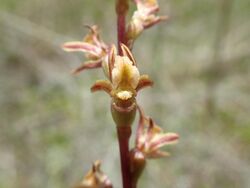Biology:Prasophyllum caudiculum
| Guyra leek orchid | |
|---|---|

| |
| Prasophyllum caudiculum growing near Guyra | |
| Scientific classification | |
| Kingdom: | Plantae |
| Clade: | Tracheophytes |
| Clade: | Angiosperms |
| Clade: | Monocots |
| Order: | Asparagales |
| Family: | Orchidaceae |
| Subfamily: | Orchidoideae |
| Tribe: | Diurideae |
| Subtribe: | Prasophyllinae |
| Genus: | Prasophyllum |
| Species: | P. caudiculum
|
| Binomial name | |
| Prasophyllum caudiculum | |
Prasophyllum caudiculum, commonly known as the Guyra leek orchid, [2] is a species of orchid endemic to a small area of northern New South Wales. It has a single tubular, bright green leaf and up to thirty five greenish to reddish-brown flowers crowded along an erect flowering stem. It grows in grassy places near Guyra.
Description
Prasophyllum caudiculum is a terrestrial, perennial, deciduous, herb with an underground tuber and a single tube-shaped, bright green leaf, 300–450 mm (12–18 in) long with a reddish-purple base. Between ten and thirty five flowers are crowded along the flowering spike. The flowers are greenish-brown to reddish-brown. As with others in the genus, the flowers are inverted so that the labellum is above the column rather than below it. The dorsal sepal is narrow egg-shaped to lance-shaped, 6–7 mm (0.2–0.3 in) long, about 3 mm (0.1 in) wide and curves downwards. The lateral sepals are linear to lance-shaped, 8–9 mm (0.3–0.4 in) long, about 2 mm (0.08 in) wide and separated from each other. The petals are linear in shape, about 6 mm (0.2 in) long and 1 mm (0.04 in) wide. The labellum is broadly oblong to elliptic, 5–6 mm (0.20–0.24 in) long, about 5 mm (0.2 in) wide and turns upwards at about 90° near its middle, often extending between the lateral sepals. The edge of the labellum flares widely and is wavy near its tip. There is a broad, green, fleshy, channelled callus in the centre of the labellum. Flowering occurs from October to December.[2][3][4]
Taxonomy and naming
Prasophyllum caudiculum was first formally described in 2000 by David Jones from a specimen collected near Guyra and the description was published in The Orchadian.[2][5] The specific epithet (caudiculum) is derived from Latin meaning "a little tail", referring to the narrow labellum mid-lobe.[2]
Distribution and habitat
This leek orchid grows with grasses and herbs on the New England Tableland.[3]
References
- ↑ "Prasophyllum caudiculum". https://biodiversity.org.au/nsl/services/apc-format/display/138773. Retrieved 3 September 2023.
- ↑ 2.0 2.1 2.2 2.3 Jones, David L. (2006). A complete guide to native orchids of Australia including the island territories. Frenchs Forest, N.S.W.: New Holland. p. 205. ISBN 1877069124.
- ↑ 3.0 3.1 Weston, Peter. "Prasophyllum caudiculum". Royal Botanic Garden Sydney - plantnet. http://plantnet.rbgsyd.nsw.gov.au/cgi-bin/NSWfl.pl?page=nswfl&lvl=sp&name=Prasophyllum~caudiculum. Retrieved 4 November 2017.
- ↑ Jones, David L. (2000). "Ten new species of Prasophyllum (Orchidaceae) from south-eastern Australia". The Orchadian 13 (4): 155–156.
- ↑ "Prasophyllum caudiculum". APNI. https://id.biodiversity.org.au/instance/apni/575046. Retrieved 4 November 2017.
Gallery
External links
Wikidata ☰ Q15488871 entry
 |



